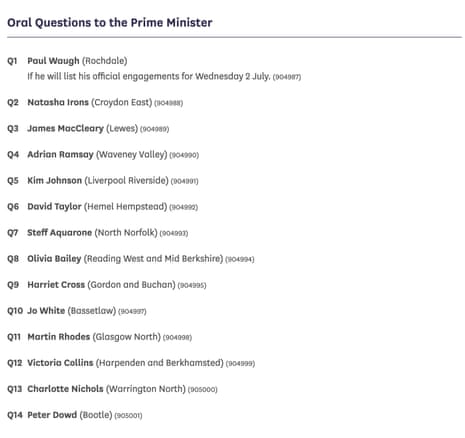Starmer to face PMQs after welfare bill climbdown
The UK Covid-19 inquiry is hearing evidence from former health secretary Matt Hancock today. I’ll be sharing updates as they come in.
Also, at 12pm we have prime minister’s questions (PMQs) where prime minister Keir Starmer will be taking questions in parliament.
Here is the list of MPs down to ask a question.

Key events
And the prime minister is on his way to the House of Commons for today’s PMQs.
Keir Starmer has said that the Labour government is “delivering the biggest boost to social and affordable housing in decades”. In a series of posts on X on Wednesday, the prime minister wrote:
‘I don’t think we’ll ever be able to get our own place’. I heard that constantly after 14 years of Tory failure on housing. I don’t want to hear it again. My Labour government is delivering the biggest boost to social and affordable housing in decades.
The Tories snatched the dream of home ownership away from an entire generation. With the biggest boost to social and affordable housing in decades, my Labour government will make it a reality for families across Britain.
Starmer to face PMQs after welfare bill climbdown
The UK Covid-19 inquiry is hearing evidence from former health secretary Matt Hancock today. I’ll be sharing updates as they come in.
Also, at 12pm we have prime minister’s questions (PMQs) where prime minister Keir Starmer will be taking questions in parliament.
Here is the list of MPs down to ask a question.
When ministers announced major changes to welfare, many were left in shock that such deep cuts would be enacted by a Labour government, despite the urgent need to address the spiraling cost of benefits. But thanks to strong opposition from disabled people, organisations and rebel Labour MPs, many of the proposals were amended or removed before the bill passed through parliament.
The Guardian spent time with dissenting voices in the run-up to the vote, to learn what was at stake for disabled people, already disproportionately affected by rising poverty in the UK. You can watch the video report here:
Rayner defends Starmer, saying he is ‘doing the job for Britain’
Angela Rayner has defended Keir Starmer as “doing the job for Britain” as he approaches his first year in office.
The deputy prime minister said “there’s been a lot going on” in the 12 months since Starmer entered Downing Street, and indicated that she is not interested in the job running the country, reports the PA news agency.
Speaking to ITV’s Lorraine programme on Wednesday, Rayner was asked whether the prime minister is tired, and responded:
Even before I was in politics, I said that have you ever seen a prime minister after a year or two in government?
And people always say to me, do you want to be prime minister? Not a chance. It’ll age me by 10 years within six months.
She added:
It is a very challenging job, and there’s been, to be fair for Keir Starmer, there’s been a lot going on.
He’s been all around the world trying to repair the relationships in Europe. We’ve got the trade deals that the previous government wasn’t able to do, tackling the things like the tariffs that the president in the US wanted to put on to the UK, which would have damaged our economy again.
There’s a lot going on, and the prime minister’s been [ …] here, there and everywhere, doing the job for Britain.
Polling expert Prof Sir John Curtice has referred to Starmer’s first year in office as “the worst start for any newly elected prime minister”.
He told Times Radio that the prime minister was “never especially popular” and that “the public still don’t know what he stands for.”
Asked if she would be interested in being prime minister at some point, Rayner told the ITV programme: “No”.
She said that she is “passionate” about issues including workers’ rights and council housing. “I’m very interested in delivering for the people of this country, because … to be elected as an MP from my background was incredible,” she said, adding:
Having that opportunity to serve my community that have raised me, looked after me, given me opportunities, and I don’t forget that. And to be deputy prime minister of this country … it’s got to count for something.”
Frances Ryan has spoken to disabled people to get their reactions to the passing of watered-down welfare bill. You can read the news feature here:

Alexandra Topping
The chief executive of a miscarriage of justice watchdog for England, Wales and Northern Ireland has resigned after serious failings in the case of Andrew Malkinson.
Karen Kneller, who had held the position since 2013, has left her job at the Criminal Cases Review Commission (CCRC) after one of the worst miscarriages of justice in British legal history, it was announced on Wednesday.
Malkinson, who spent 17 years in prison for a rape in Greater Manchester that he did not commit, was cleared in July 2023. His case was knocked back twice by the CCRC until his legal team carried out crucial DNA testing that was then repeated by the commission and led to his release.
A report on the CCRC’s handling of the case in July last year laid bare “a catalogue of failures”, finding that Malkinson could have been exonerated almost a decade earlier. Thousands of cases are now being reviewed as a result of the botched process.
The welfare bill passed, but it was chaos, writes John McDonnell. In his latest Guardian opinion piece, McDonnell warns that “a party this dysfunctional and divided cannot escape the wrath of voters at the next election”.
You can read it here:
Children should not be strip-searched or detained unless a last resort, say MPs

Ben Quinn
Children should not be detained in custody unless arrested for a serious crime and strip-searched only under truly exceptional circumstances, two parliamentary reports have said.
Harrowing testimonies of children in England and Wales who were strip-searched and who accused police of racism and making damaging, disrespectful comments are included in the research for the all-party parliamentary group (APPG) on children in police custody.
The reports – the culmination of a year’s research involving children, police forces and parents – were released days after the sacking of two Metropolitan police officers who were involved in the strip-search of a schoolgirl who become known as Child Q.
While a police misconduct hearing found that racism was not a factor in that incident, the research gives voice to young people who said that racism was a factor in their strip-searches.
Children as young as 10 in England and Wales are currently subject to the same processes and have essentially the same protections as adults when they are detained in police custody.
Instead, the MPs on the group say that police detention should be the last resort for a child and that any initial detention period should be limited to 12 hours – half of the time that adults can be held before they must be charged or released.
Dr Miranda Bevan, a law lecturer at King’s College London who led an inquiry for the APPG, said that children who were detained were disproportionately likely to have special educational or communication needs, to have been exploited or suffered victimisation, and to have been known to mental health authorities.
“Yet these children – some as young as 10 – are being left alone in a police cell, with very limited adult support, for up to 24 hours,” she said. “They are expected to decide whether or not they want to accept legal representation; a decision that they should not be asked to make in those circumstances.
“We must reshape police custody into a space that recognises and responds to the unique needs of children. Reform must be rooted in evidence, and that evidence starts with listening to children and examining their experiences.”
The APPG puts forward 10 recommendations, including a ban on strip-searching children unless under truly exceptional circumstances and making it a requirement that legal advice be provided for all children detained in police custody.
On Wednesday, Angela Rayner sought to reassure people who had been “scared” about the proposed benefits changes, reports the PA news agency.
Speaking to ITV’s Lorraine, the deputy prime minister said:
Anyone listening to your show today, they know that there will be no changes to their welfare.
I want to make sure that people are reassured by that, because a lot of people have been scared about what’s going to happen.
Twelve of England’s regional mayors back plan for ‘national active travel network’

Peter Walker
Twelve of England’s regional mayors have signed up to an unprecedented plan to create a “national active travel network”, focusing initially on helping children to walk, cycle or scoot to school safely.
The scheme, which involves all non-London regional mayors other than one from Reform UK, is intended to fit into wider efforts to devolve transport planning, working with Active Travel England (ATE) to implement schemes they think would help their area.
It has the backing of Chris Whitty, the chief medical officer for England, who said the scheme has the potential to “significantly improve” public health in the areas involved, covering 20 million people overall.
The 12 mayors, nine of them Labour and two Conservative, plus Luke Campbell, the Reform UK mayor of Hull and East Yorkshire, have signed a joint pledge to “work together to improve our streets for everyone, for the benefit of the health, wellbeing and connectedness of our communities”.
The initial focus from this autumn will be on trips to and from school, with a pledge to create a combined 3,500 miles of routes safely linking schools to homes, town and city centres, and transport hubs.
It will be based around interventions such as safer road crossings and blocking motor traffic outside schools at drop-off and pick-up times.
Ministers ‘have to work harder’ to bring down small boat numbers, says McFadden
Ministers are going to “have to work harder” to bring down small boat crossings, a member of Keir Starmer’s cabinet has said amid record numbers in the first half of this year, reports the PA news agency.
Pat McFadden told LBC “everyone in government knows it’s a big challenge” but he declined to give an assurance that the figures would be down by this time next year.
The chancellor of the duchy of Lancaster said:
We are going to have to work harder to bring the numbers down.
Everyone in government knows it’s a big challenge, and as a team we are determined to meet it.
Pressed specifically on whether the numbers would be down by this time next year, McFadden said:
I’m not going to make a prediction.
Asked again for an assurance that the numbers will reduce, he added:
I can give you an assurance that the numbers at the moment are too high. We are working together to tackle this.

Peter Walker
Helen Miller, the new head of the Institute for Fiscal Studies thinktank, said the lack of savings from the personal independence payments (Pip) changes made tax rises “increasingly likely” at the budget and that the chancellor, Rachel Reeves, now had “very little wriggle room”.
The welfare bill as it stood would now not create any savings, she told Today:
By the end of this parliament the government will save nothing.
With the £5bn gone, and about £1bn extra going on the recent U-turn over winter fuel payments, much of Reeves’s fiscal headroom had gone, Miller said, particularly if growth forecasts were scaled back.
The overall handling of the bill, which involved a sequence of climbdowns over Pip as ministers faced the prospect of the first defeat for a government bill at second reading since 1986, has led to fingers being pointed at the Downing Street political operation, Labour whips and Keir Starmer himself.
Co-leader of the Green party Carla Denyer has said that “it’s time” for the chancellor, Rachel Reeves, to “look for fairer and more sensible ways to raise money – like a wealth tax on multimillionaires and billionaires”.
Posting on X on Wednesday morning, Denyer wrote:
After govt’s 11th hour 59th minute climbdown over Pip it’s time for Reeves to go back to the drawing board and look for fairer and more sensible ways to raise money – like a wealth tax on multimillionaires and billionaires to raise up to £24bn a year.
Ministers should be looking at measures around wealth taxes or capital gains tax, a leading backbench rebel has suggested.
Rachael Maskell told BBC Radio 4’s Today programme that “we need to look at those with the broader shoulders”.
Asked what she would say to those who are worried about public finances, Maskell said:
As am I worried about the state of the public finances, and of course, we know what we inherited a year on, we have still got to keep our focus there.
And that’s why I think we heard very much in the debate, including from myself, that we need to look at those with the broader shoulders, as the prime minister said, contributing more into our system, but never pushing down on the poorest.
And that was what the dynamic was yesterday, that we do need to look at things like a wealth tax, £24bn, or equalisation of capital gains tax.
Here is our news story on the welfare bill being voted through yesterday:
And our interactive which shows how your MP voted:
What happened yesterday with the welfare bill?
In case you missed yesterday’s political developments, here is a handy summary from my colleague Andrew Sparrow:
-
MPs voted through the government’s welfare bill by 335 votes to 260 – a majority of 75 – after a rebel amendment to kill off the bill was defeated easily after concessions over planned Pip cuts.
-
The work and pensions secretary, Liz Kendall, ruled out resigning in her interview with Chris Mason, the BBC political editor, saying she wanted to carry on despite her bill only passing after multiple U-turns.
-
After a week of chaos that left the prime minister’s political authority badly damaged, Labour MPs were finally won over by a commitment to shelve plans for deep cuts to personal independence payments (Pip)
Ministers’ concessions on the welfare bill signalled a “change in power between the prime minister” and disabled people, one of the leading backbench rebels has suggested, reports the PA news agency.
Rachael Maskell told BBC Radio 4’s Today programme that Tuesday saw “the bill disintegrating before our eyes”.
“Even in the last moments of the debate, when the minister was winding up, we heard that other sections of the bill will be removed that’s appertaining to Northern Ireland,” she said, adding:
And I think throughout the day, what we saw was a change in power between the prime minister and his government and disabled people across our country, they having their voice at the heart of parliament, and that’s why I put the reasoned amendment down.
The York Central MP also said that she is “glad” that the debate was “had in public” and “now disabled people should feel empowered to have their voice at long last in an ableist parliament”.
Cabinet minister declines to rule out tax rises after welfare concessions, saying there’ll be ‘financial consequences’
A cabinet minister has declined to rule out tax rises after Labour’s welfare concessions to backbench rebels.
Pat McFadden told BBC Breakfast he is “not going to speculate” on what could be in the budget, due in the autumn, but said that ministers “will keep to the tax promises” in their manifesto.
Labour faces renewed speculation over its tax plans after concessions to the party’s welfare rebels left a £4.8bn hole in Rachel Reeves’s spending plans.
Asked whether economists were right that tax rises look likely, the chancellor of the duchy of Lancaster told the programme:
This is one moving part of the budgetary picture, it does have a financial consequence yesterday.
I’m not going to speculate on where the budget lands, because there are so many other different moving parts in it, and it wouldn’t make sense for me to do that.
Asked explicitly whether he could rule out tax rises, McFadden said:
I’m not going to speculate on the budget.
We will keep to the tax promises that we made in our manifesto when we fought the election last year. But it doesn’t make sense for me to speculate on something where, as I say, there are so many moving parts of which this is only one element.
Separately, McFadden told Times Radio that there will be “financial consequences” to the government’s concessions to welfare rebels.
He told Times Radio:
This is a decision that will have financial consequences. The process of the last couple of weeks does have financial consequences.
They will all be taken together with all the other moving parts that there are in the economy, in the fiscal picture at the budget, and that will be set out at the time. But I’m not denying that when you set out on a plan that has a cost attached to it, and then you have to change that or take it forward in slower time, that is a decision with financial consequences.
MPs voted through the government’s welfare bill by 335 votes to 260 – a majority of 75.
The concessions, including the last-minute shelving of plans to restrict eligibility for personal independence payments (Pip), were enough to head off the government’s first Commons defeat on Tuesday evening. But they also removed a key plank of Keir Starmer’s welfare reform agenda, delaying changes to Pip until after a review of the benefit not due to conclude until autumn 2026.
More on this in a moment, but first, here are some other developments:
-
Ministers should be looking at measures around wealth taxes or capital gains tax, a leading backbench rebel has suggested, after concessions left a hole in the chancellor’s spending plans. Rachael Maskell told BBC Radio 4’s Today programme that “we need to look at those with the broader shoulders”.
-
MPs will debate legislation today to ban Palestine Action. A draft order was laid before parliament on Monday to amend the Terrorism Act 2000 to include Palestine Action as a proscribed organisation, making membership and support for the direct action group illegal. If approved, it would become a criminal offence punishable by up to 14 years in prison. It is expected MPs and peers will debate the legislation over Wednesday and Thursday and, if approved, the ban could come into force by Friday.
-
Children should not be detained in custody unless arrested for a serious crime and strip-searched only under truly exceptional circumstances, two parliamentary reports have said. Harrowing testimonies of children in England and Wales who were strip-searched and who accused police of racism and making damaging, disrespectful comments are included in the research for the all-party parliamentary group (APPG) on children in police custody.
-
Twelve of England’s regional mayors have signed up to an unprecedented plan to create a “national active travel network”, focusing initially on helping children to walk, cycle or scoot to school safely. The scheme, which involves all non-London regional mayors other than one from Reform UK, is intended to fit into wider efforts to devolve transport planning, working with Active Travel England (ATE) to implement schemes they think would help their area.